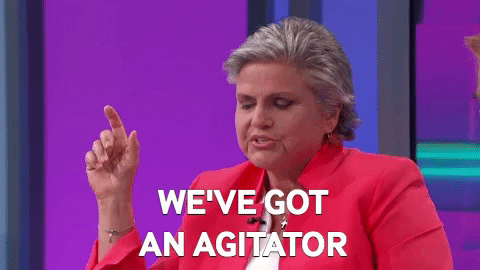Gaslighting at work
If your boss is questioning your wellbeing, maybe they're a reality-denying asshole with a gaslighting problem?
The original edition of this article was published on my website in September 2022. As I build my Substack, I’m bringing over content that better suits Current Fad. Check back as articles are added, or check out the archive on my website. Even better, support the refreshing of old content, and the development of new pieces, by becoming a paid subscriber.
I met a curious, clever young woman recently. She was smart, a real systems thinker, and passionate about doing great work. When we got to talking about solving problems at work, she screwed up her nose in frustration.
"I tried raising some of this with my boss," she began "but he didn't want to know."
I listened while she explained that she'd tried to raise a variety of issues, and that she'd tackled them in a constructive fashion, creating a shared whiteboard online for suggestions, solutions and ideas. Cool idea, right? People loved it, and immediately started contributing.
Until her manager saw it. Before it could gain real traction, her manager, feeling threatened at her initiative, demanded she delete it immediately. (Although not fast enough, as it turned out. Members of her team had been excited for the opportunity to contribute and were confused when the whiteboard disappeared.)
It gets worse. Following the dismissal of her bright idea, she was called into his office while he enquired about her "wellbeing," suggesting she turn to the workplace-funded counselling service if she wasn't coping.
I. Am. Furious.
This is a clearcut abuse of power.
In short: this is gaslighting at work. Feeling threatened by the prospect of his power being challenged or shortcomings being revealed, this male manager used his position of authority to demean and invalidate his young staffer, implying it was more likely she was crazy than there was something wrong.
Gaslighting is sneaky
Unsurprisingly, this was not the first or last time she had encountered this kind of behaviour. This particular example is pretty clear-cut, but they aren't all this easy to spot. Other varieties of gaslighting at work are sneakier: you might have it suggested or implied that you're being paranoid, or oversensitive.
Perhaps you've been accused of overreacting or making trouble when you've raised concerns or called out behaviour that felt off. Maybe you have your judgement or expertise overruled or challenged in a way that suggests you're missing the point, when you're pretty confident you're not.
Perhaps you're accused of not having a sense of humour, or told you need to calm down when your feelings are hurt. You might be blamed for small mistakes you're sure you didn't make, or told you misheard or misunderstood comments that were clearly stated.
Gaslighting is about denying reality
Gaslighting is psychological manipulation aimed at undermining your grip on reality. It leaves you questioning your feelings, experiences or interpretation of a situation and while it is certainly not exclusively levied at women, we are more likely to suffer it.
The term comes from the the 1940 film Gaslight, where Ingrid Bergman’s character has a thieving husband, who managed to convince her that she’s a mentally unstable kleptomaniac. When he fossicks around in the attic, stealing her jewellery, he switches on the attic lights, reducing the supply of gas downstairs, and making the downstairs lights flicker.
When Bergman’s character mentions the flickering lights, he tells her she’s paranoid. The lie happens so often, that she questions her own perception of reality.
The husband in Gaslight and the manager in this scenario have a couple of things in common here: they’re doing the wrong thing, they’re filled with shame, and when called out, they have two choices: fess up, or turn the tables.
Both choose to turn the shame gun on their victims instead, by denying reality to themselves, and distorting reality for the innocent party.
Gaslighting happens to people who are already vulnerable
Women, along with other marginalised groups such as people of colour, people who speak English as a second language, neurodiverse people and disabled people, are more likely to be painted as irrational, emotional or unreasonable in all spheres, including at work - and white, able-bodied men disproportionately occupy the positions of power that allow them to wield this tactic against their staff and colleagues.
Gaslighting happens to strong people
You could be forgiven for thinking it is only meek, quiet people who struggle with this - but you'd be wrong. This particular woman was a confident, articulate professional who had no qualms about taking initiative and speaking up... at least, she was. She'd been shrinking a little recently, she confided in me, and starting to wonder if it was worth the fuss. Did I have any advice, she asked? How could she adapt to these circumstances and find a way to have her point heard?
I resisted every impulse to grab her by the shoulders and shout YOU SHOULD NOT HAVE TO ADAPT TO THIS SHIT! because I was in a training workshop, but my face said most of those words, until I had the chance to talk to her 1:1 later.
While devastating to hear, this is no surprise. Over time, gaslighting erodes confidence. We start second-guessing ourselves and our skills, feel confused, blame ourselves for "not getting it" and become indecisive, questioning our judgement and understanding. It is a cruel, malicious power grab wielded by people who lack the strength and confidence to engage in open conversations that might threaten their status or power, and it's not OK.
Calling out gaslighting is risky
I left this conversation feeling dejected, upset, and frustrated there was nothing I could do to fix it. In workplaces that produce and reward leaders who behave this way, there is little recourse for their victims. Gaslighters are often popular. They're in positions of power that elevate their judgement and opinion, where their decisions receive the benefit of the doubt. They risk little when they label others as troublemakers.
Those labelled as troublemakers, however, pay a heavy price. Taking issues to HR, or to senior leadership, creates a cascade of intervention, scrutiny and doubt with minimal payoff, even when you're successful. It's socially and professionally isolating, as people avoid being tarred with the same brush, and in most cases, the powerful simply consolidate their power.
Sanctions are pitiful, if they even exist and despite the media furore about "cancel culture" most abusers continue to operate unchecked, even when their behaviour has been exposed.
Resilience is not the answer
In my work, I expend a lot of energy instructing people in strategic systems thinking. I urge them to challenge unchecked norms and conventions, dig deeper to solve entrenched issues and assume positive intent of the people they work with who are often playing the same unwinnable games. To be more influential, I implore, you need to agitate from within, meet people where they're at and engage with compassionate curiosity to solve problems together.
But in situations like this, that advice goes out the window. It is not the responsibility of people who are being bullied, gaslit or abused at work - or anywhere - to be more resilient, cope better, or fix the system that's hurting them. It is the responsibility of people with power to use it with care.
Don’t try to change them, just leave
My advice to this young woman, though it hurt to give, was simple: Get the f**k out of there. You do not have to tolerate this. You do not have to be the one who's stronger, better or more tenacious. You do not need to assemble a case, prove your experiences or become "more resilient." You need to get out.
I hate giving this advice. Weekly, I encounter stories of bright, incredible professionals who've opted out of systems and situations that bring them down. Women who are sexually harassed or assaulted. People of colour who are treated as tokens and never listened to. Disabled people with activist fatigue who tire of being brave and resilient. Working class people who accept they'll never belong because they don't speak the language or have the right networks.
Sometimes they leave completely. In other cases, they do what this young woman had done: they shrink. They stop speaking up, they stop pushing for change and they resign themselves to a less fulfilling work life, deciding it isn't worth the trouble.
In either case, we all lose. We dilute the quality of decisions, hamstring the impact of our services, and preserve the unchallenged, outdated dominance of people who assume power and status as their birthright.
If you're being gaslit at work, know this:
You're not crazy
I believe you
It's not you that needs to change
I'm sorry
Get the f**k out. You deserve better.
P.S. Welcome to Current Fad, my reader-supported Substack newsletter. If you’ve just found this and have no idea who I am - hello! It’s nice to meet you. You can learn more about me and my writing journey in this introductory post or the About section.
If you’ve been following me for the last few years - thanks for coming to see me here.
If you enjoyed this article, and you’d like to see more, please consider becoming a paid subscriber. After years of creating and distributing free content, I’m excited to build a more direct and rewarding relationship with my audience. I’d love that to include you.












